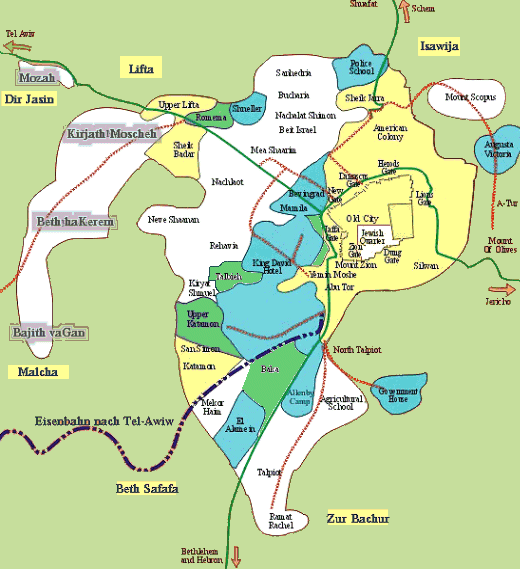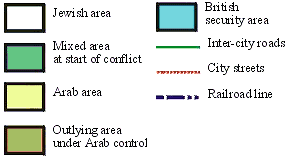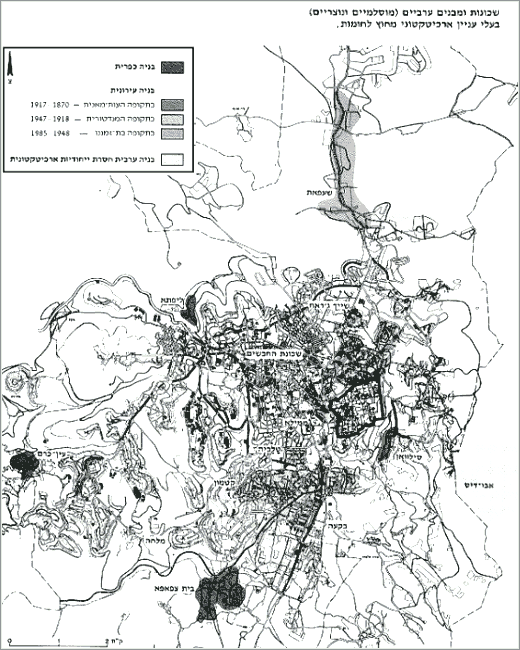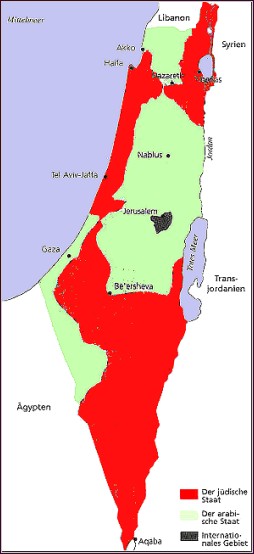|
Ungewisse Zukunft:
Jerusalem 1947
Im Schatten von Kampf und Terror:
1947 wird das Leben in Jerusalem immer schwieriger. Es ist ein Jahr des
Kampfes gegen die Mandatsmacht und der britischen Restriktionen. Im
Dezember, nach dem UN-Votum zugunsten der Gründung eines judischen und eines
arabischen Staates, entbrennen zusätzlich neue arabisch-jüdische Kämpfe, die
1948 in einen landesweiten Krieg münden...
 |
| Jerusalem 1947 |
 |

Adrikhaluth b'Iruschalajim: haBnijah haArwith michuz
laChomoth
David Krojanker, Keter Jerusalem 1985 |

Die Unabhängigkeit des Staates Israel:
Der Weg zum 14.Mai 1948
Am 29. November 1947 stimmte die
Vollversammlung der Vereinten Nationen für die Errichtung von zwei Staaten
auf dem Gebiet des britischen Mandatsgebietes (westlich des Jordans) - eines
jüdischen und eines arabischen Staates. Die Juden nahmen den Vorschlag an,
die Araber lehnten ihn ab. Am 14. Mai 1948 wurde der Staat Israel gegründet.
Die UNO Resolution 1947 zum Thema Jerusalem
Hier finden Sie den Gesamttext
der UN-Resolution vom 29. November 1947
C. THE CITY OF JERUSALEM
The boundaries of the City of Jerusalem are as defined in
the recommendations on the City of Jerusalem. (See Part III, section B,
below).
Part III. - City of Jerusalem (5)
A. SPECIAL REGIME
The City of Jerusalem shall be established as a corpus
separatum under a special international regime and shall be administered by
the United Nations. The Trusteeship Council shall be designated to discharge
the responsibilities of the Administering Authority on behalf of the United
Nations.
B. BOUNDARIES OF THE CITY
The City of Jerusalem shall include the present
municipality of Jerusalem plus the surrounding villages and towns, the most
eastern of which shall be Abu Dis; the most southern, Bethlehem; the most
western, 'Ein Karim (including also the built-up area of Motsa); and the
most northern Shu'fat, as indicated on the attached sketch-map (annex B).
C. STATUTE OF THE CITY
The Trusteeship Council shall, within five months of the
approval of the present plan, elaborate and approve a detailed statute of
the City which shall contain, inter alia, the substance of the following
provisions:
- Government machinery; special objectives. The Administering Authority
in discharging its administrative obligations shall pursue the following
special objectives:
- To protect and to preserve the unique spiritual and
religious interests located in the city of the three great monotheistic
faiths throughout the world, Christian, Jewish and Moslem; to this end
to ensure that order and peace, and especially religious peace, reign in
Jerusalem;
- To foster cooperation among all the inhabitants of
the city in their own interests as well as in order to encourage and
support the peaceful development of the mutual relations between the two
Palestinian peoples throughout the Holy Land; to promote the security,
well-being and any constructive measures of development of the residents
having regard to the special circumstances and customs of the various
peoples and communities.
Governor and Administrative staff. A Governor of the City of Jerusalem
shall be appointed by the Trusteeship Council and shall be responsible
to it. He shall be selected on the basis of special qualifications and
without regard to nationality. He shall not, however, be a citizen of
either State in Palestine.
The Governor shall represent the United Nations in the City and shall
exercise on their behalf all powers of administration, including the
conduct of external affairs. He shall be assisted by an administrative
staff classed as international officers in the meaning of Article 100 of
the Charter and chosen whenever practicable from the residents of the
city and of the rest of Palestine on a non-discriminatory basis. A
detailed plan for the organization of the administration of the city
shall be submitted by the Governor to the Trusteeship Council and duly
approved by it.3.
Local autonomy
- The existing local autonomous units in the territory
of the city (villages, townships and municipalities) shall enjoy wide
powers of local government and administration.
- The Governor shall study and submit for the
consideration and decision of the Trusteeship Council a plan for the
establishment of special town units consisting, respectively, of the
Jewish and Arab sections of new Jerusalem. The new town units shall
continue to form part the present municipality of Jerusalem.
Security measures
- The City of Jerusalem shall be demilitarized;
neutrality shall be declared and preserved, and no para-military
formations, exercises or activities shall be permitted within its
borders.
- Should the administration of the City of Jerusalem be
seriously obstructed or prevented by the non-cooperation or interference
of one or more sections of the population the Governor shall have
authority to take such measures as may be necessary to restore the
effective functioning of administration.
- To assist in the maintenance of internal law and
order, especially for the protection of the Holy Places and religious
buildings and sites in the city, the Governor shall organize a special
police force of adequate strength, the members of which shall be
recruited outside of Palestine. The Governor shall be empowered to
direct such budgetary provision as may be necessary for the maintenance
of this force.
Legislative Organization.
A Legislative Council, elected by adult residents of the city irrespective
of nationality on the basis of universal and secret suffrage and
proportional representation, shall have powers of legislation and
taxation. No legislative measures shall, however, conflict or interfere
with the provisions which will be set forth in the Statute of the City,
nor shall any law, regulation, or official action prevail over them. The
Statute shall grant to the Governor a right of vetoing bills
inconsistent with the provisions referred to in the preceding sentence.
It shall also empower him to promulgate temporary ordinances in case the
Council fails to adopt in time a bill deemed essential to the normal
functioning of the administration.
Administration of Justice.
The Statute shall provide for the establishment of an independent
judiciary system, including a court of appeal. All the inhabitants of
the city shall be subject to it.
Economic Union and Economic Regime.
The City of Jerusalem shall be included in the Economic Union of Palestine
and be bound by all stipulations of the undertaking and of any treaties
issued therefrom, as well as by the decisions of the Joint Economic
Board. The headquarters of the Economic Board shall be established in
the territory City. The Statute shall provide for the regulation of
economic matters not falling within the regime of the Economic Union, on
the basis of equal treatment and non-discrimination for all members of
thc United Nations and their nationals.
Freedom of Transit and Visit: Control of residents.
Subject to considerations of security, and of economic welfare as
determined by the Governor under the directions of the Trusteeship
Council, freedom of entry into, and residence within the borders of the
City shall be guaranteed for the residents or citizens of the Arab and
Jewish States. Immigration into, and residence within, the borders of
the city for nationals of other States shall be controlled by the
Governor under the directions of the Trusteeship Council.
Relations with Arab and Jewish States. Representatives of the Arab and
Jewish States shall be accredited to the Governor of the City and
charged with the protection of the interests of their States and
nationals in connection with the international administration of thc
City.
Official languages.
Arabic and Hebrew shall be the official languages of the city. This will
not preclude the adoption of one or more additional working languages,
as may be required.
Citizenship.
All the residents shall become ipso facto citizens of the City of
Jerusalem unless they opt for citizenship of the State of which they
have been citizens or, if Arabs or Jews, have filed notice of intention
to become citizens of the Arab or Jewish State respectively, according
to Part 1, section B, paragraph 9, of this Plan.
The Trusteeship Council shall make arrangements for consular protection of
the citizens of the City outside its territory.
Freedoms of citizens
- Subject only to the requirements of public order and
morals, the inhabitants of the City shall be ensured the enjoyment of
human rights and fundamental freedoms, including freedom of conscience,
religion and worship, language, education, speech and press, assembly
and association, and petition.
- No discrimination of any kind shall be made between
the inhabitants on the grounds of race, religion, language or sex.
- All persons within the City shall be entitled to
equal protection of the laws.
- The family law and personal status of the various
persons and communities and their religious interests, including
endowments, shall be respected.
- Except as may be required for the maintenance of
public order and good government, no measure shall be taken to obstruct
or interfere with the enterprise of religious or charitable bodies of
all faiths or to discriminate against any representative or member of
these bodies on the ground of his religion or nationality.
- The City shall ensure adequate primary and secondary
education for the Arab and Jewish communities respectively, in their own
languages and in accordance with their cultural traditions.
The right of each community to maintain its own schools for the
education of its own members in its own language, while conforming to
such educational requirements of a general nature as the City may
impose, shall not be denied or impaired. Foreign educational
establishments shall continue their activity on the basis of their
existing rights.
- No restriction shall be imposed on the free use by
any inhabitant of the City of any language in private intercourse, in
commerce, in religion, in the Press or in publications of any kind, or
at public meetings.
Holy Places
- Existing rights in respect of Holy Places and
religious buildings or sites shall not be denied or impaired.
- Free access to the Holy Places and religious
buildings or sites and the free exercise of worship shall be secured in
conformity with existing rights and subject to the requirements of
public order and decorum.
- Holy Places and religious buildings or sites shall be
preserved. No act shall be permitted which may in any way impair their
sacred character. If at any time it appears to the Governor that any
particular Holy Place, religious building or site is in need of urgent
repair, the Governor may call upon the community or communities
concerned to carry out such repair. The Governor may carry it out
himself at the expense of the community or communities concerned if no
action is taken within a reasonable time.
- No taxation shall be levied in respect of any Holy
Place, religious building or site which was exempt from taxation on the
date of the creation of the City. No change in the incidence of such
taxation shall be made which would either discriminate between the
owners or occupiers of Holy Places, religious buildings or sites or
would place such owners or occupiers in a position less favourable in
relation to the general incidence of taxation than existed at the time
of the adoption of the Assembly's recommendations.
Special powers of the Governor in respect of the Holy Places,
religious buildings and sites in the City and in any part of Palestine.
- The protection of the Holy Places, religious
buildings and sites located in the City of Jerusalem shall be a special
concern of the Governor.
- With relation to such places, buildings and sites in
Palestine outside the city, the Governor shall determine, on the ground
of powers granted to him by the Constitution of both States, whether the
provisions of the Constitution of the Arab and Jewish States in
Palestine dealing therewith and the religious rights appertaining
thereto are being properly applied and respected.
- The Governor shall also be empowered to make
decisions on the basis of existing rights in cases of disputes which may
arise between the different religious communities or the rites of a
religious community in respect of the Holy Places, religious buildings
and sites in any part of Palestine.
In this task he may be assisted by a consultative council of
representatives of different denominations acting in an advisory
capacity.
D. DURATION OF THE SPECIAL REGIME
The Statute elaborated by the Trusteeship Council the
aforementioned principles shall come into force not later than 1 October
1948. It shall remain in force in the first instance for a period of ten
years, unless the Trusteeship Council finds it necessary to undertake a
re-examination of these provisions at an earlier date. After the expiration
of this period the whole scheme shall be subject to examination by the
Trusteeship Council in the light of experience acquired with its
functioning. The residents the City shall be then free to express by means
of a referendum their wishes as to possible modifications of regime of the
City.
(1) See Official Records of the General Assembly, Second
Session Supplement No. 11,Volumes l-lV.
* At its hundred and twenty-eighth plenary meeting on 29 November 1947
the General Assembly, in accordance with the terms of the above resolution,
elected the following members of the United Nations Commission on Palestine:
Bolivia, Czechoslovakia, Denmark, Panama, and Philippines.
(2) This resolution was adopted without reference to a Committee.
(3) The following stipulation shall be added to the declaration
concerning the Jewish State: "In the Jewish State adequate facilities shall
be given to Arabic-speaking citizens for the use of their language, either
orally or in writing, in the legislature, before the Courts and in the
administration."
(4) In the declaration concerning the Arab State, the words "by an Arab
in the Jewish State" should be replaced by the words "by a Jew in the Arab
State."
(5) On the question of the internationalization of Jerusalem, see also
General Assembly resolutions 185 (S-2) of 26 April 1948; 187 (S-2) of 6 May
1948, 303 (lV) of 9 December 1949, and resolutions of the Trusteeship
Council (Section IV).
hagalil.com |